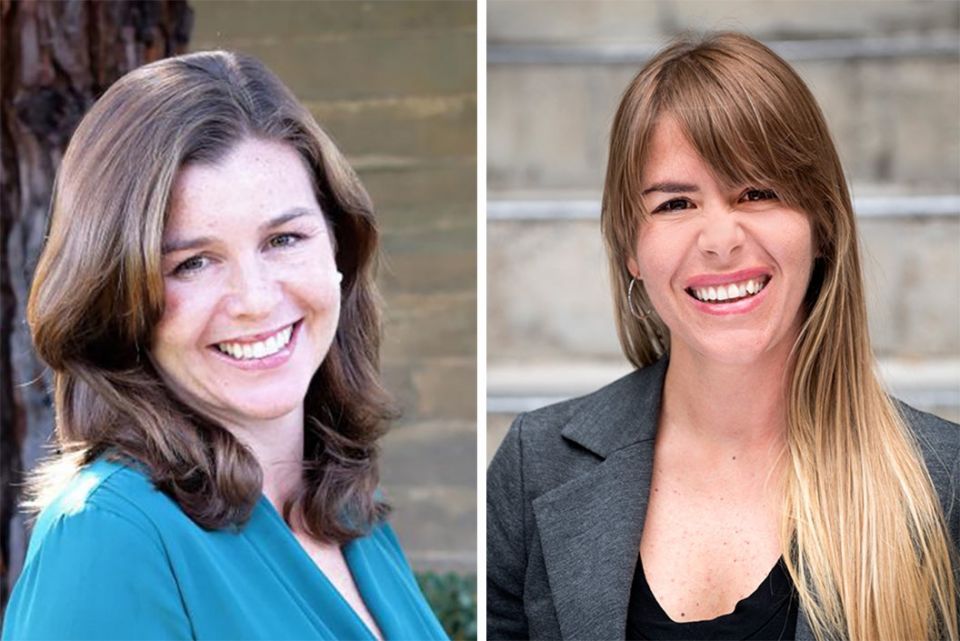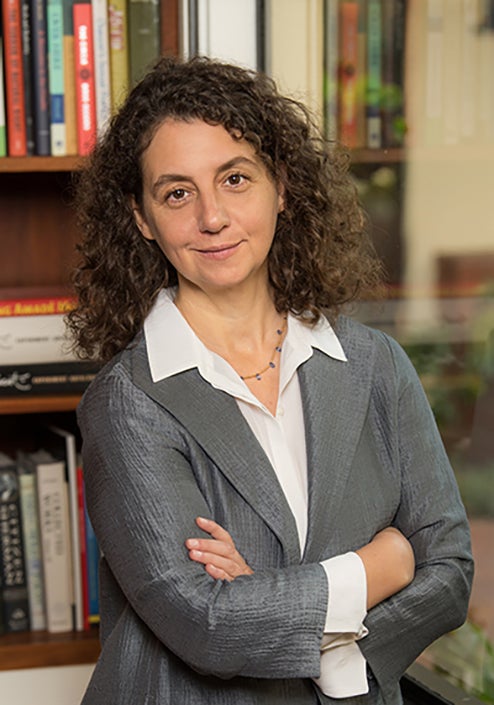Stanford is concentrating on local impacts of COVID-19 in its latest effort to respond to the effects of the public health pandemic that has exacerbated systemic inequities and created new ones in surrounding communities.

A teacher in the Graduate School of Education’s Stanford Teacher Education Program teaching a class prior to the start of the COVID-19 pandemic. STEP is collaborating with the Sunnyvale School District on a summer school program to provide in-person recovery learning and extra support to elementary and middle school students. (Image credit: Joe Mazza Photography)
The university’s Office of Community Engagement (OCE), in collaboration with the Bill Lane Center for the American West in the School of Humanities and Sciences, announced that eight faculty-led projects will receive a total of $228,000 to work with community-based organizations and government agencies in Santa Clara County and San Mateo County. Awardees were selected by a cross-campus faculty and staff selection committee through a competitive process.
The projects focus on addressing pandemic-related impacts in four areas severely affected by the virus: health, education, social services and the arts. Health-related projects include improving access to COVID-19 information and vaccines in under-resourced communities and supporting youth mental health through the convening of a diverse Youth Advisory Group. Efforts in the social services space aim to reduce pretrial incarceration rates by helping people make their court appearances, and advancing equity for predominantly minority and undocumented communities. Meanwhile, arts and education projects will seek to connect East Palo Alto youth to emerging creative practices and tools, develop a summer internship program for Foothill College students interested in pursuing humanities-adjacent careers or courses of study and provide in-person recovery learning opportunities for K-8 students in Sunnyvale.
“The Stanford community has stepped up in many ways to work with our neighbors and local leaders as we deal with the many difficult challenges created by COVID-19. The university is committed to supporting that continued engagement as we move into the next phase of recovery and ultimately beyond the pandemic,” said Martin Shell, vice president and chief external relations officer. “The pandemic has underscored the need for many vital services, especially for the most vulnerable residents of this area. The Stanford community has been active in helping many groups in our region, and we are grateful to the many faculty members who are leading the way to deepen collaboration with community organizations in service to the community.”
OCE received 45 proposals from across the university. Seventeen applicants were advanced to the final stage, where the selection committee determined the eight finalists, which span five of the seven schools with faculty representing Engineering, Law, Humanities and Sciences (H&S), Education and Medicine. Each grant recipient includes a community collaborator from San Mateo or Santa Clara counties who has co-created time-bound projects to accelerate results.
Bruce Cain, political scientist and faculty director of the Lane Center, said he is pleased to support OCE’s efforts by offering Lane Center funds to the research-practice partnership led by Stanford Impact Labs. The Labs are a new university model that connects academic expertise to pressing challenges. “Regional coordination and collaboration are critical, and OCE is helping connect our campus to those practitioners who see the greatest needs firsthand.”
Moving with community
Faculty are already working with their collaborators on the projects, with many planning to launch this quarter. The OCE grants offer a quicker infusion of funding to accelerate and deepen work by faculty in the community. In part, recipients were chosen by how quickly they could deploy OCE funding to support existing work to meet pressing needs in the community.
“Given the impact the pandemic has had on our region, it was important that we accelerate the community benefit of the grants by focusing on projects that can move quickly to help those in need,” said Megan Swezey Fogarty, associate vice president for community engagement. “These projects are addressing both challenges that existed before COVID-19 and were made worse over the last year, as well as some new ones that resulted from the pandemic.”
Grant recipients pointed to the timeliness of the funding in helping to scale their work and reach additional people during this period of increased demand for services and support.
“This funding will allow us to deepen our community of practice for local promotoras de salud or community health workers and expand our work to co-create culturally appropriate outreach materials for local Latinx communities,” said Patricia Rodriguez Espinosa, associate director of research in the Stanford Medicine Office of Community Engagement and instructor in the Department of Epidemiology and Population Health. “The grant will support both our on-the-ground work in Santa Clara County and capacity building for community health workers in neighboring Santa Cruz and San Mateo counties through the development and sharing of new trainings and resources.”
Tem Woldeyesus, clinical assistant professor in Stanford Medicine’s Division of Primary Care and Population Health, said, “We must support building digital capacity to potentiate ongoing efforts by our community partners, such as Roots Community Health Center, to address widening racial disparities due to the pandemic. OCE funding has been an essential first step in overcoming the tremendous challenges ahead of us in advancing health equity.”
Project descriptions
The following descriptions were provided by the faculty members leading each project:
Project Name: Local Impact Labs University Collaborative
Faculty: Jeremy Weinstein, professor of political science, School of Humanities and Sciences; faculty director, Stanford Impact Labs
In Collaboration With: Silicon Valley Community Foundation, Joint Venture Silicon Valley
Description: Seeking to tackle the drivers of systemic inequity in Silicon Valley that have left the bottom quartile of the region – disproportionately BIPOC communities and undocumented residents – unable to achieve financial well-being, stable housing and upward economic mobility, Stanford Impact Labs will help launch research-practice partnerships that investigate regional systemic inequities. Local Impact Labs will pair faculty-led teams from local higher education institutions with Silicon Valley Community Foundation grantees and regional leaders to apply research and evidence to advance equity.
Project Name: Pilot Interventions to Reduce Pretrial Incarceration
Faculty: Sharad Goel, assistant professor of management science and engineering, School of Engineering
In Collaboration With: Santa Clara County Public Defender Office
Description: To reduce pretrial incarceration and help individuals get to court, Goel is working with the Santa Clara County Public Defender Office to automate text message reminders and arrange transportation assistance to the court. With increased appearance rates fueled by their intervention, they expect a reduction in incarceration that can stem from missed court dates, directly improving the lives of the most vulnerable community members.
Project Name: Emerging Creative Practices: Teacher Training and Curriculum Development for Youth Arts Education
Faculty: Adam Banks, professor of education, Graduate School of Education; faculty director, Institute for Diversity in the Arts
In Collaboration With: EPACENTER
Description: Through student-to-student residencies, internships and contributions to teacher training, the Institute for Diversity in Arts will connect East Palo Alto youth to emerging creative practices and tools. The project will expand the range of skills that EPA youth learn; prepare EPA youth to work with and make productive connections to industry leaders through EPACENTER’s workforce development programs, apprenticeships and internships; and further a workforce of highly skilled, creative and technologically savvy East Palo Alto residents.
Project Name: Digital Humanities Research & Training for Foothill College Students
Faculty: Giovanna Ceserani, associate professor of classics, School of Humanities and Sciences; faculty director, Center for Spatial and Textual Analysis, Office of the Dean of Research
In Collaboration With: Humanities Mellon Scholars Program Director, Foothill College
Description: The Center for Spatial and Textual Analysis (CESTA) is partnering with Foothill College to develop a summer quarter 2021 program for Foothill College students interested in pursuing humanities-adjacent careers or courses of study. Students will be paired with Stanford humanities doctoral students for an eight-week summer internship, over the course of which the interns will work on digital humanities projects and learn transferable skills such as research design, data analysis and visualization techniques and digital publication strategies. Feedback and lessons learned will support CESTA’s development of a broader community college digital humanities research internship program for students from institutions across San Mateo and Santa Clara counties.
Project Name: Co-Teaching Mentorship with Sunnyvale School District – Supplemental Teaching & Learning Experience for STEP Graduates
Faculty: Ira Lit, associate professor (teaching) of education, Graduate School of Education
In Collaboration With: Sunnyvale School District
Description: The Stanford Teacher Education Program (STEP) is collaborating with the Sunnyvale School District on a summer school program to provide in-person recovery learning and extra support to K-8 Sunnyvale students. In addition, the summer school program will offer an opportunity for an in-person supplemental teaching and learning experience for recent STEP graduates, who spent most or all of this year teaching in an online classroom context. These summer opportunities will be of great benefit to district students and families, as well as to the STEP graduates, many of whom will go on to teaching positions in Santa Clara and San Mateo counties.

Lisa Goldman Rosas & Patricia Rodriguez Espinosa (Image credit: Courtesy Woods Institute; Patricia Rodriguez Espinosa)
Project Name: Community Health Workers Promoting COVID-19 Vaccine Awareness and Public Health Guidelines in Latinx Communities
Faculty: Lisa Goldman Rosas, assistant professor (research) of epidemiology and population health and of medicine; faculty director, Office of Community Engagement, Stanford School of Medicine (SOM); Patricia Rodriguez Espinosa, instructor, epidemiology and population health; associate director of research, Office of Community Engagement, SOM
In Collaboration With: SOMOS Mayfair
Description: In a community of practice and learning, n/community health workers (CHWs) will receive training and co-develop resources to raise awareness about COVID-19 vaccines in under-resourced communities, combat misinformation and promote public health guidelines. The project will strengthen and evaluate the effectiveness of resources and outreach in four key areas: 1) capacity development among CHWs; 2) evidence-based materials (particularly in Spanish) for community members addressing COVID-19 misinformation and adherence to prevention guidelines; 3) social media as a tool for promoting vaccine confidence and uptake; 4) mental health resources.
Project Name: allcove Youth – Amplifying Youth Mental Health Services and Voices
Faculty: Steven Adelsheim, clinical professor of psychiatry and behavioral sciences; director, Stanford Center for Youth Mental Health and Wellbeing, SOM
In Collaboration With: Safe and Supportive Schools, San Mateo County Office of Education
Description: Given the escalating youth mental health crisis worsened by the global pandemic, this project aims to convene a Youth Advisory Group made up of diverse young people, with strong representation from low-English literacy, low-income communities. Youth advisors will inform and propel the advancement of three projects – allcove, the Stanford K-12 Mental Health Collaborative and the Media and Mental Health Initiative – to develop a peer listening and supportive training that potentially includes elements of Mental Health First Aid, the Belonging Project, empathy training and suicide prevention programs. The project will create a safe and supportive environment for youth leaders and equip them to better support and educate their peers on mental health-related issues.
Project Name: Bridging Technological Divide in Pandemic Resources for Marginalized Communities
Faculty: Temesgen Woldeyesus, clinical assistant professor, SOM
In Collaboration With: Roots Community Health Center (San Jose)
Description: To circumvent the digital divide and promote health equity, the project aims to build digital capacity and infrastructure within a trusted community partner, Roots Community Health Center, to technologically scale ongoing efforts to reduce widening racial disparities in Santa Clara County. They will deploy a 12-month pilot of a multilingual two-way text-messaging-based community engagement solution to build a trust-based community outreach and awareness campaign for COVID and vaccine-related education, support current vaccine-related operations, and integration of an existing COVID/Telehealth outreach program to support troubleshooting vaccine registration and assess technological gaps for marginalized community members.
More information about the Office of Community Engagement’s work in the region is available at community.stanford.edu
Media Contacts
Joel Berman, University Communications: (650) 208-8819; joelberman@stanford.edu







